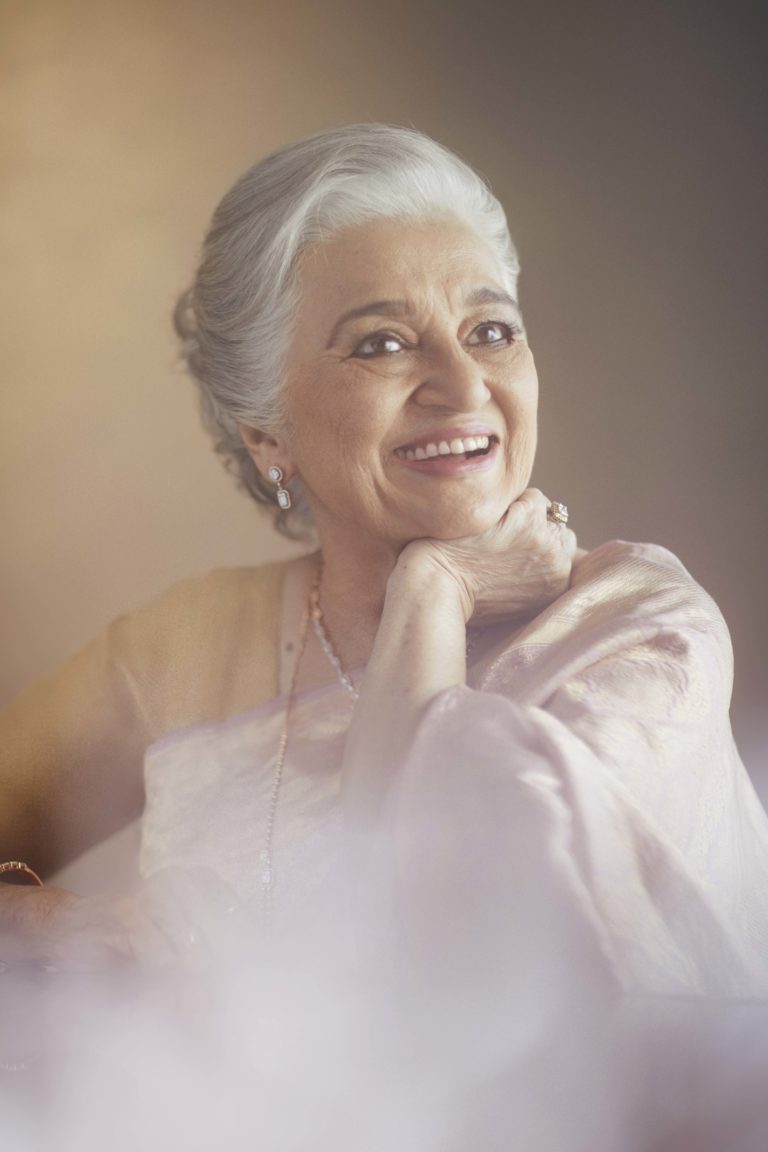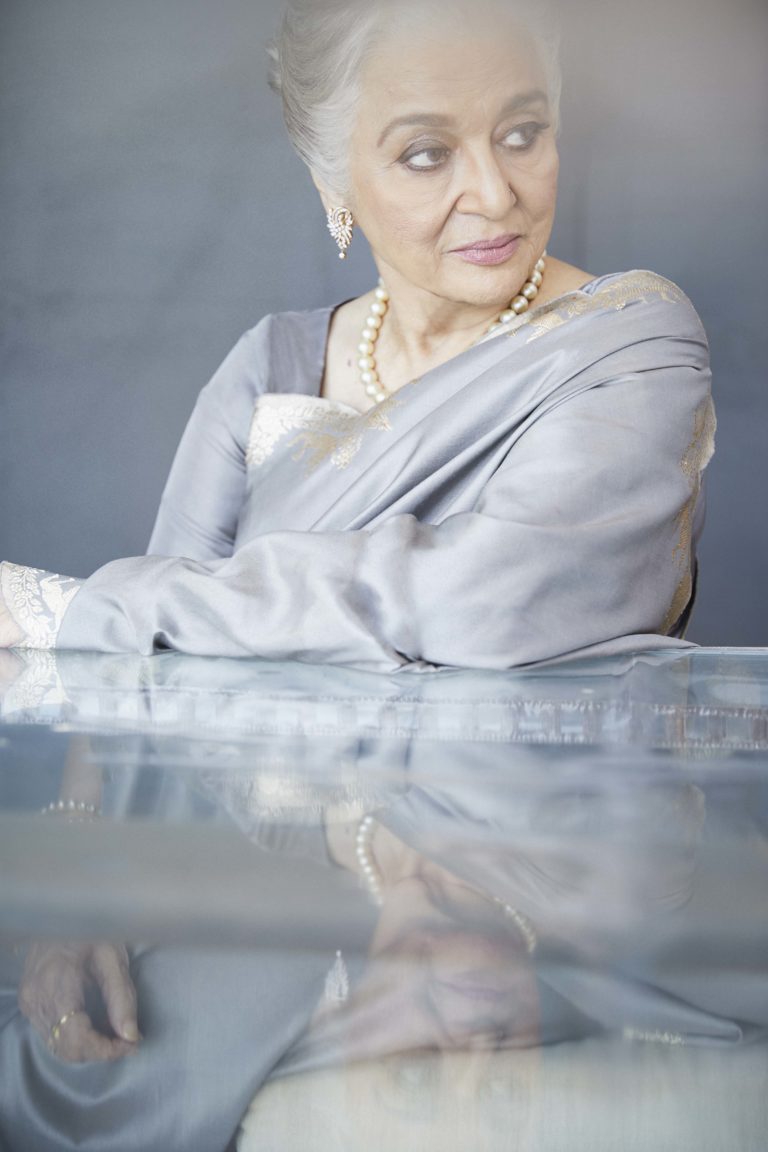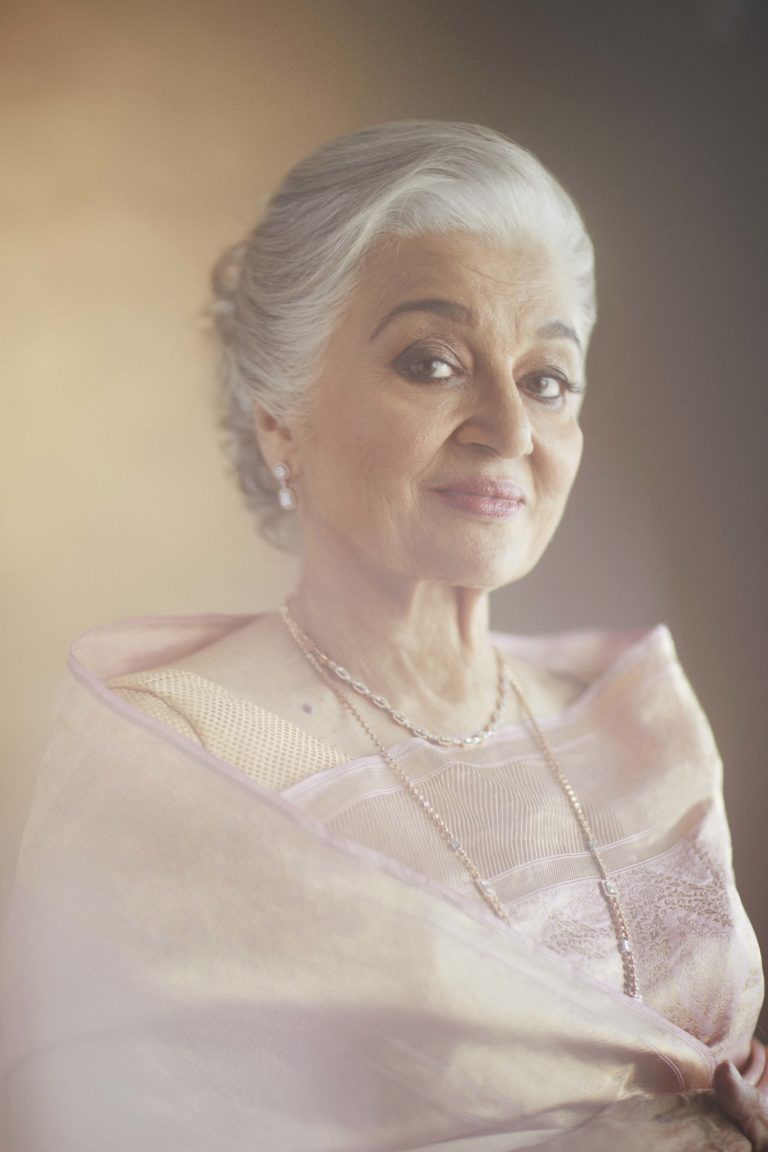VICTOR OF
CIRCUMSTANCE
At a time when unmarried women were the exception, ’60s superstar Asha Parekh defied the norm and rejected a long list of suitors. Bollywood history rookie and the soon-to-wed Sadaf Shaikh reconciles her 21st-century feminist ideology with the still-single actor’s understated iconoclasm as their conversation elides the 50 years between them. . .
STYLED BY SHWETA NAVANDAR
PHOTOGRAPHED BY SUSHANT CHHABRIA
HAIR BY PERPETUAL RODRIGUES
MAKE-UP BY TULSI SOLANKI

Sari, from Raw Mango; earrings, necklaces, bracelet, all from Gehna Jewellers; ring, Asha’s own.
A day before I am scheduled to meet Asha Parekh, I undertake the ambitious task of reading her biography overnight. Once I am through and tucked into bed, Parekh makes a surprising appearance in my dreams. I say surprising because I haven’t watched a single Bollywood movie that released before I was born in 1992 — not even Sholay — which means all my sleep-induced visuals are by-products of my memory of the few images I came across while perusing Khalid Mohamed’s labour of love, The Hit Girl, which chronicles the actor’s eventful life. When she infiltrates my REM stage, however, Parekh is not the present-day thespian that would greet me at her roomy Juhu residence the next day but the doe-eyed, bouffant-sporting star in her prime, who could disarm men with a smile and dance like a celestial apsara. That’s not to say she isn’t as beguiling today as she was 40 years ago; I am instantly in awe of her, before I even cross the threshold, as I take in her sharp eyes, sincere smile and dulcet voice. Parekh ushers me into her home, and there is absolutely no indication of her celebrity status, especially not as she lifts a seemingly heavy floor fan all by herself and places it in my direction to give me some respite from the sweltering October heat. Seated across from her, I can easily see why she was the highest-paid and most successful actor of her time. I, for one, would’ve liked to witness her in action during her glory days, and while The Hit Girl has allowed me a momentary glimpse into her life — turning points, unrequited love, regrets and all — it is a whole other experience to listen to her recount the events firsthand. “The images turned out rather well, don’t you think?” Parekh is beaming at me, and I snap back to the present as I realise she’s referring to the previous day’s shoot. I haven’t had a chance to see them yet, but it doesn’t matter because I am already biased; it’s impossible for Parekh to look anything but timelessly gorgeous. Could that be why she never married? I ask myself as my restless mind wanders. Did no man ever match up to her standards? Did her reputation and beauty intimidate prospective suitors? When I pose these questions to her, she smiles at me sagely. “Staying alone was probably one of the best decisions I made. I was in love with a married man and didn’t want to be a homewrecker so, in retrospect, it was the only choice I had, according to the way I wanted to live my life,” she says matter-of-factly.
“I was always aware that epic love is only found in the movies. But romantic ties weren’t the only kind of relationships I paid attention to.”
I find myself agreeing with her, even though my 27 years of experience have nothing on her illustrious 77. Until earlier this year, I had completely sworn off marriage, not because of a dearth of good men, but simply because I didn’t have room in my life for a partner and the co-dependency that came with one. It was only recently, when I unwittingly fell for my best friend of 10 years, that my stance on romance changed, and I decided to abandon the enticing throes of singledom. “You see,” Parekh says knowingly, “Time and circumstance are everything. You can’t stop what is meant to happen, and you can’t force what isn’t fated to occur.” I smile in spite of myself; this is exactly the kind of thing I’d expect my grandmother to say as she tightly braids my oil-drenched hair. She continues, “But I hope you know you’re signing up for a life of endurance. Men can be temperamental, and you have to learn to be the balancing force in this relationship. During my time in the industry, there were instances of star couples having trouble in their marriages because the men used to philander. It was the women who chose to stick by them even though they knew the kind of shenanigans their husbands were up to. Those marriages have now endured, only because the lady of the house mastered the art of forgiveness or even ignorance at times.” I am overcome with the sudden urge to hug Parekh; I want to tell her that times have significantly changed since, that the onus of making a marriage work isn’t only on our gender, that we are well within our rights to give up a relationship for no reason other than ‘I didn’t quite feel a spark’. But there will be an opportunity for that later, off the record. The more immediate task at hand is to delve into the psyche of a woman who, despite having her pick of men, chose a solitary existence over the comfort of companionship while her peers and contemporaries hopefully succumbed to the lure of domestic life and a happily ever after.

Sari, from Raw Mango; earrings, necklace and bangles, all Asha’s own.
Excerpts from a conversation. . .
Your parents had an inter-caste love marriage — a rarity in their time. Did you view love through rose-tinted glasses while growing up in such a family?
My parents were very much in love and, back then, it was a deviation for a Hindu man to marry a Muslim girl; it was almost guaranteed that you would be estranged from your family forever. But everyone has to bow down in the face of true love. And their marriage was a very successful one. My mother was a spirited woman, and she managed to bring the whole family together when I was convinced that they’d be cross with us forever. My parents’ love was truly the stuff of fairy tales. When my mother passed away, it felt like my father lost a good chunk of his soul. And although it made me sad to see him that way, it also reinforced my belief in the all-consuming power of love.
In your movies, you often essayed the role of a sweet-natured girl in love with a boy who did not belong to an affluent family. His heart, however, would be richer than a king’s treasury. How did playing these characters affect the way you viewed relationships?
I am a thorough romantic at heart, but I am a realist as well. Like the characters I played, I truly felt that there was nothing wrong with a poor man and a rich girl falling in love; an anomaly in those times since a sound bank statement was the cornerstone of every relationship. Even so, I was always aware that epic love is only found in the movies. But romantic ties weren’t the only kind of relationships I paid attention to. I have always been a very sentimental person. If I saw a person suffering, my heart would go out to them.
After Main Tulsi Tere Aangan Ki (1978) released, many women wrote to you saying that they identified with your role of being the other woman. You tried to respond to each and every one of them. What advice did you give them?
Long story short, I told them to steer clear of married men. And this is something I believed in and practised myself. You are hurting somebody, and it gets so much worse if children are involved — they grow up with all sorts of insecurities. If you think your marriage isn’t going to work out, don’t produce children because you end up muddling their idea of love. I know I admitted to being in love with Nasir Hussain in The Hit Girl, but as much as I loved him, I could never consider breaking up his family and traumatising his children. It was far simpler and satisfying to be on my own. Make no mistake, it wasn’t like I didn’t want to get married. In fact, my mother was very keen on it and had even assembled my trousseau in advance. I met my share of boys but the end result was always the same — they weren’t the right kind of men for me. Over time, my mother also gave up her dream of seeing me as a bride because whomever she showed my horoscope to would say my marriage wouldn’t be a successful one. It was not the kind of thing I believed in, but it did grant me some semblance of peace.

Often, people get married simply because they’re petrified of being alone during old age. Did you ever have any such apprehensions?
Not at all. I saw the kind of people that were out there. When I went out with the boys that my mother set me up with, I was completely put off by the whole premise of marriage. They were so fussy! They’d take longer to get ready than I did and would keep preening in the mirror. The narcissism was repulsive. I know it seems silly but these little things really nettled me. There was also the case of my heroes Rajesh Khanna and Vinod Khanna getting an earful from their girlfriends during outstation shoots because they were gallivanting and making merry at night instead of being in bed. I would’ve never been able to take someone dictating terms to me — I was just not cut out for it.
I did come very close to tying the knot once with a professor from the US. I was visiting him and we were in a cafe at 2 a.m., when he turned to me and nonchalantly said, ‘I have a girlfriend and you’ve come in the way’. It completely caught me off guard. In a way, that was the final straw for me in this whole wedding business. My friend was travelling with me at the time and when I told her that we were returning to India that very instant, she asked me how I wasn’t gutted that I was cutting ties so unceremoniously with the man I was supposed to be marrying. When I gave her the unedited version, she was livid, but I told her to let it go and, with time, got over it myself. However, his birthday came around a few months later and I expectantly sent him presents, hoping to give the relationship another shot. When I called him, he began rambling in Gujarati and that seemed odd to me because we normally conversed in English. That’s when I learnt that he was in bed with his girlfriend while talking to me. It upset me, and I took it quite badly for a while, but eventually, I got over it. I am a firm believer of the phrase ‘This too shall pass’. And it did.
“Marriage is not all rainbows and butterflies; you have to give in to your partner’s whims every now and then, and that’s a two-way street.”
One of your regrets in life was not being able to adopt a child. Do you believe that bringing one up would’ve altered your life?
I love children. I did come across a child that triggered a fervent maternal instinct in me, but he was suffering from some birth defects and the doctors refused to let me adopt him. They asked me to select another child, but my love for this child I didn’t even know was unrelenting and I was adamant on adopting only him. But it was not to be. Soon after, my mother suffered a stroke and I then got occupied with looking after her. I was very attached to mum and the very notion of having another being to care for besides her then seemed inconceivable.
In the digital age of Tinder, where people find that partners are often replaceable, do you look at today’s generation and feel like love is dead?
Today, people are falling in love and getting out of it without so much as a decent conversation about it because they don’t have tolerance. Marriage is not all rainbows and butterflies; you have to give in to your partner’s whims every now and then, and that’s a two-way street. I feel that today’s youngsters burn out too fast and call it quits over trivial issues, which shouldn’t be the case. People mistake the thrill of early love for a relationship that is capable of braving storms and get disillusioned when they find out that their partner isn’t perfect. Polygamy is becoming quite commonplace today and for someone like me who believes that love is eternal and all-encompassing, it is quite shocking. Maybe we are evolving as a species or maybe we’ve just forgotten how to love.
Do you understand friendship better than love?
Absolutely. My friends are why I’ve managed to hold on to my sanity and fight bouts of depression. Shammiji (Nargis Rabadi) was always with me before she passed away last year. I remember that I was shooting for a dance sequence when the episode with the aforementioned professor happened. She was on set at the time and she could tell that something was amiss. I didn’t want to cause any kind of drama in front of my co-stars so I kept brushing her off, but she could tell I needed a shoulder to cry on. Finally, I told her the whole story in between shots and her first reaction was to cuss him. It was like instant therapy. And so I really believe that one should have friends. Saira (Banu) and I go years without meeting, but then we make sudden plans and catch up on everything. She can’t leave her home because of Yusuf (Dilip Kumar) saahab’s health. When I visit her she adorably complains about the fact that I stopped dyeing my hair black. I am closer to Waheeda (Rehman) and Helen because we travel together. Recently we went to Turkey and did a Scandinavian cruise. Waheeda and I then went to Alaska and Canada, and just a month ago, we went to Tadoba Andhari Tiger Reserve. You can never completely confide in your mother or a sibling, but close friends will never judge you.
That said, I enjoy spending time on my own as much as I do with friends, if not more. I have discovered that I have an adventurous soul and enjoy the adrenaline rush that comes with indulging in gutsy activities. I recently called up a cousin when I found out that the world’s longest urban zipline is in Dubai and told her that I absolutely had to do it next time I visited the city. She laughed incredulously but didn’t try to talk me out of it because she knows that once I have my heart set on something — whether that is remaining single or bungee jumping off the tallest building in the world — I won’t stop at anything to achieve it.
